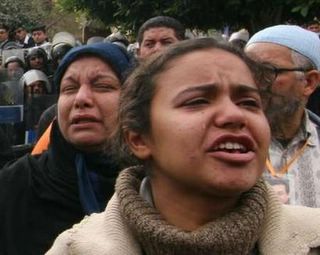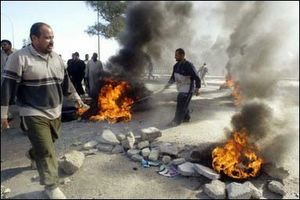Radio Nederland: Transcript of a special Amsterdam Forum with Noam Chomsky
Transmission date: 18 December 2005
ANDY CLARK
Let's start off by talking about the elections in Iraq. Let's hear how President Bush was billing them just a few days ahead of the vote:
President Bush: "By helping Iraqis build a strong democracy, we're adding to our own security and, like a generation before us, we are laying the foundation of peace for generations to come. Not far from here, where we gather today is a symbol of freedom familiar to all Americans - the Liberty Bell. When the Declaration of Independence was first read in public, the Liberty Bell was sounded in celebration and a witness said: 'It rang as if it meant something.' Today the call of liberty is being heard in Baghdad and Basra, and other Iraqi cities, and its sound is echoing across the broader Middle East, from Damascus to Tehran, people hear it and they know it means something. It means that days of tyranny and terror are ending and a new day of hope and freedom is dawning."
ANDY CLARK
Professor Chomsky, how do you see the elections? Do you see them as an important milestone for Iraq?
NOAM CHOMSKY
Actually I do, but before talking about that, I should just bring up a kind of a truism. No rational person pays the slightest attention to declarations of benign intent on the part of leaders, no matter who they are. And the reason is they're completely predictable, including the worst monsters, Stalin, Hitler the rest. Always full of benign intent. Yes that's their task. Therefore, since they're predictable, we disregard them, they carry no information. What we do is, look at the facts. That's true if they're Bush or Blair or Stalin or anyone else. That's the beginning of rationality. All right, the basic facts we know: when Bush and Blair invaded Iraq, the reason was what they insistently called a 'single question.' That was repeated by Jack Straw, by Colin Powell, Condoleezza Rice, everyone. 'Will Iraq eliminate its weapons of mass destruction?' That was the single question, that was the basis on which both Bush and Blair got authorization to use force. Within a few months this single question was answered and the answer came out the wrong way and then all of sudden...
ANDY CLARK
This was weapons of mass destruction you're talking about?
NOAM CHOMSKY
Yes. Then very quickly it turned out that that wasn't the reason of the invasion. The reason was what the President's liberal press calls his 'Messianic Mission' to bring democracy to Iraq and immediately everyone had to leap on the democratisation bandwagon and it began to be described as the most noble war in history and so on and so forth. Well, anyone with a particle of sense would know that you can't take that seriously and, in fact, if you look at the events that followed, it just demonstrated that. The US tried, in every possible way, to prevent elections in Iraq. They offered effort after effort to evade the danger of elections. Finally, they were compelled to accept elections by mass non-violent resistance, for which the Ayatollah Sistani [moderate Shi'ite leader] was a kind of a symbol. Mass outpourings of people demanding elections. Finally, Bush and Blair had to agree to elections. The next step is to subvert them and they started immediately. They're doing it right now. Elections mean you pay some - in a democracy at least - you pay some attention to the will of the population. Well, the crucial question for an invading army is: 'do they want us to be here?' Well, we know the answer to that. The British Ministry of Defence carried out a poll a couple of months ago, it was secret, but it leaked to the British Press - I don't think it's been reported in the US. They found that 82 percent of the population wanted the coalition forces, British and US forces to leave. One percent of the population said that they were increasing security.
ANDY CLARK
But isn't this the start of a process that could see the occupying troops from America and Britain leaving? We've seen an awful lot of Iraqis taking part in the elections, two thirds, we're told. The turnout was quite high...
NOAM CHOMSKY
But hold on a second, the US and Britain announced at once, at once, we will not have a timetable to withdraw. So yes, you can all want us to leave, but we won't have a timetable for withdrawal. Now of course, there's a conflict, the Iraqis have forced the occupying powers to allow some kind of electoral process. What the occupying powers are doing now is perfectly clear and very familiar, very familiar. We've had a long history of this in Central America, the British ran an empire, the Japanese ran an empire, and the Russians ran an empire in Eastern Europe. The way they want it to work - standard procedure - you want the local forces to run their own countries, so Poland under the Russians, the Polish army runs it, the Polish civilians are the bureaucrats, Russians are in the background. The same in say, El Salvador, the US-run state terrorist forces are the military, the civilians are local, and the US is in the background. If anything goes wrong, they move in, the same with the British in India, the same with the Japanese in South Korea.
ANDY CLARK
So you see this is a step to set up a sort of puppet government and not something that's really representative of ordinary Iraqis?
NOAM CHOMSKY
That's what they are trying to do, but there's always a conflict about that. Many of the Western backed or Russian or Eastern or other backed tyrants rose up. However, it is as clear as a bell that the US, and Britain behind it, are doing everything they can to prevent a sovereign, more or less democratic Iraq. And they are being dragged into it step by step. Now there's a good reason why the US cannot tolerate a sovereign, more or less democratic Iraq. We're not allowed to talk about it because there's a party line. The party line we have to rigidly adhere to says you're not allowed to talk about the reasons for invading Iraq. We're supposed to believe that the US would've invaded Iraq if it was an island in the Indian Ocean and its main exports were pickles and lettuce. This is what we're supposed to believe. Now the truth of the matter, obvious to anyone not committed to the party line, is that Iraq has huge oil resources, maybe the second in the world, mostly untapped, that it's right in the middle of the main energy-producing region of the world and that taking control of Iraq will strengthen enormously the US's control over the major energy resources of the world. It will, in fact, give the US critical leverage over its competitors, Europe and Asia, that's Zbigniew Brzezsinski's [President Carter's national Security Adviser] accurate observation. That's the reason. Now suppose that Iraq were to become sovereign and democratic, what would happen? Just think of the policies they would undertake. I mean, we can run through them, it would be a nightmare for the US.
ANDY CLARK
You maintain that they would want to maintain control. This is an email from a listener, sent to us on the eve of the elections from Iraq, who just simply calls himself Mohammed:
Mohammed's email: "Tomorrow it's going to be us who decide and I can feel the greatness of the responsibility because the result will draw the shape of our future and will determine how long it will take till we can announce victory in this war; our war against the past, against the past's illusions and the past's mistakes."
ANDY CLARK
What would you say to a comment like that? We hear that a lot from Iraqis. I spoke to some people from the Iraqi community here in the Netherlands just a few weeks ago and they were expressing very similar sentiments that they felt they were in some way having their destiny in their own hands for the first time.
NOAM CHOMSKY
That's exactly what I've been saying for the last three years and I just said it again here. The victory of the non-violent resistance in Iraq, which compelled the occupying forces to allow elections, that's a major victory. That's one of the major triumphs of non-violent resistance that I know of. It wasn't the insurgents that did it - the US doesn't care about violence, they have more violence. What it can't control is non-violence and the non-violent movements in Iraq, partially with Sistani as a kind of figurehead, but it's much broader than that, it compelled the occupying forces to allow elections and some limited, very limited degree of sovereignty. And yet we should be trying to help them in these endeavours.
ANDY CLARK
In that sense you see that there's a positive influence from these elections and you see that those forces can grow out of these elections and take more control in Iraq?
NOAM CHOMSKY
I certainly hope so, but they're going to have to be fighting Britain and the US tooth and nail all the way. The question is what Westerners will do about it. Will we be on the side of the occupying forces, which are trying to prevent democracy and sovereignty? Or will we be on the side of the Iraqi people, who want democracy and sovereignty? But in order to ask that question we first have to free ourselves of the doctrinal blinders, which prevent us from understanding what is actually happening.
Read more









